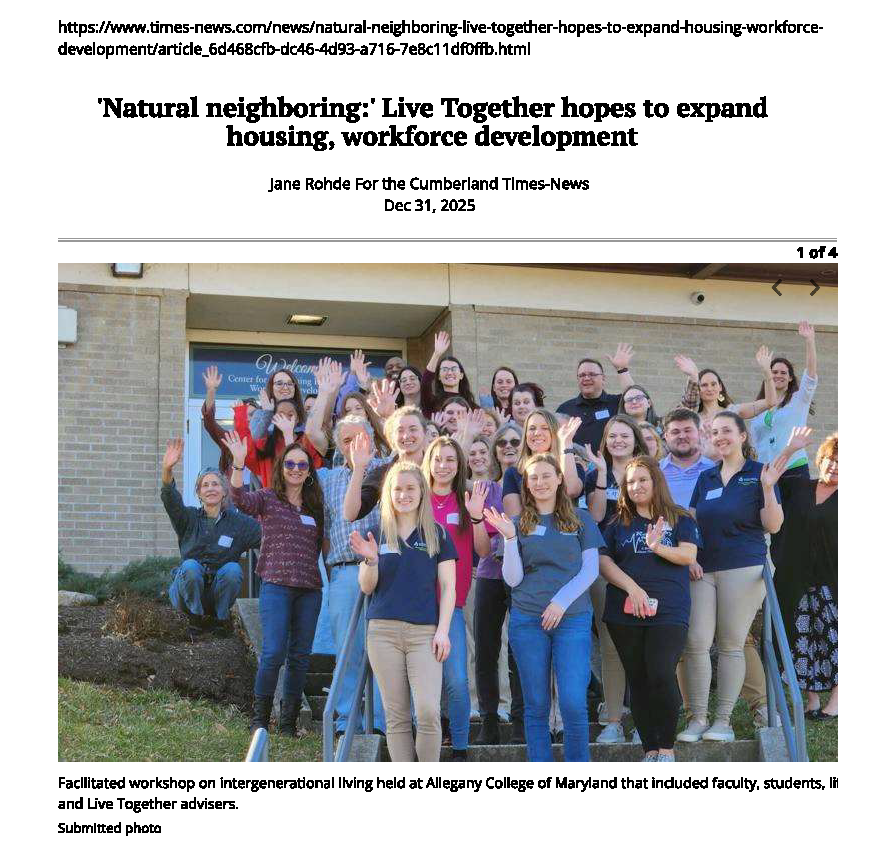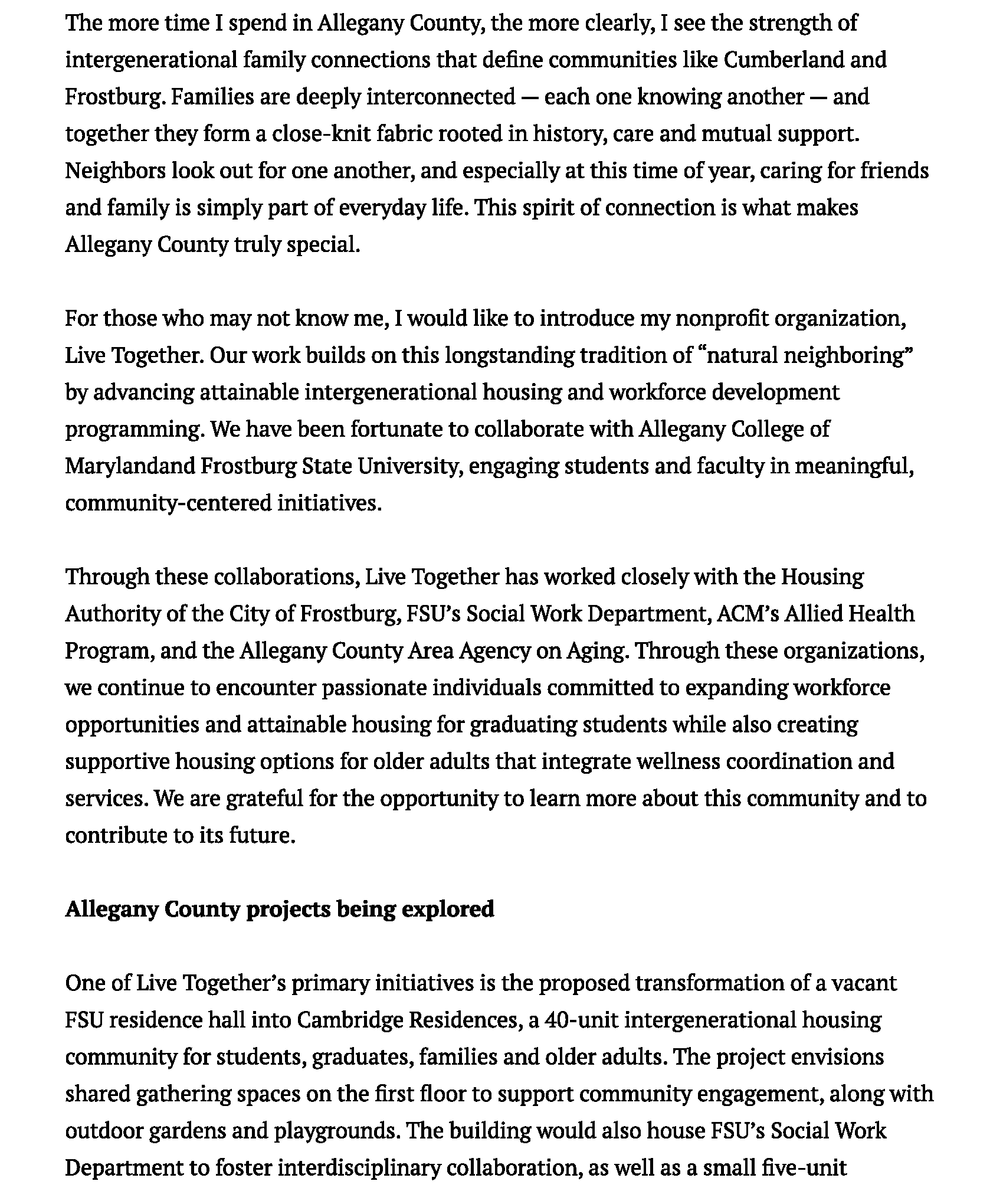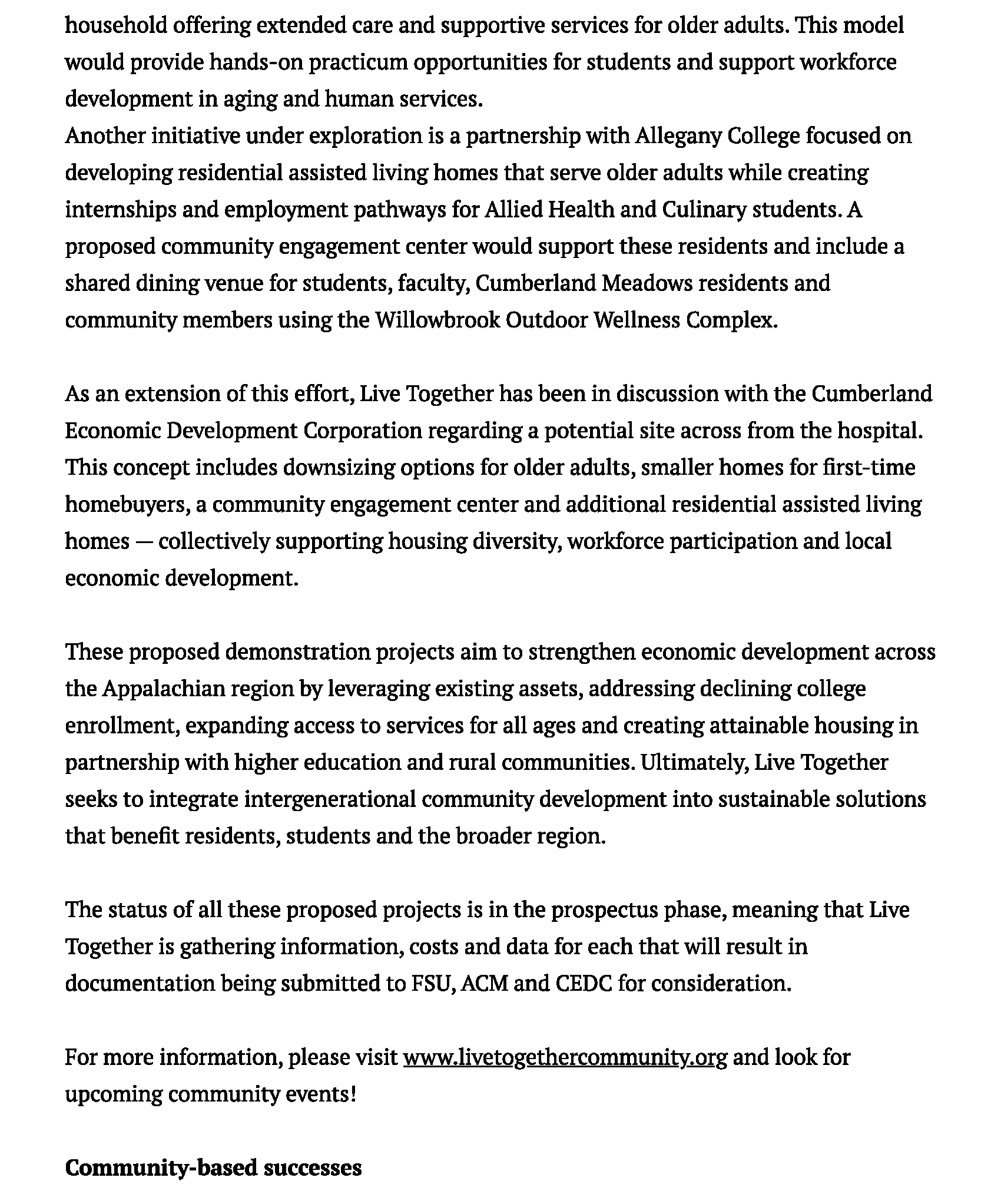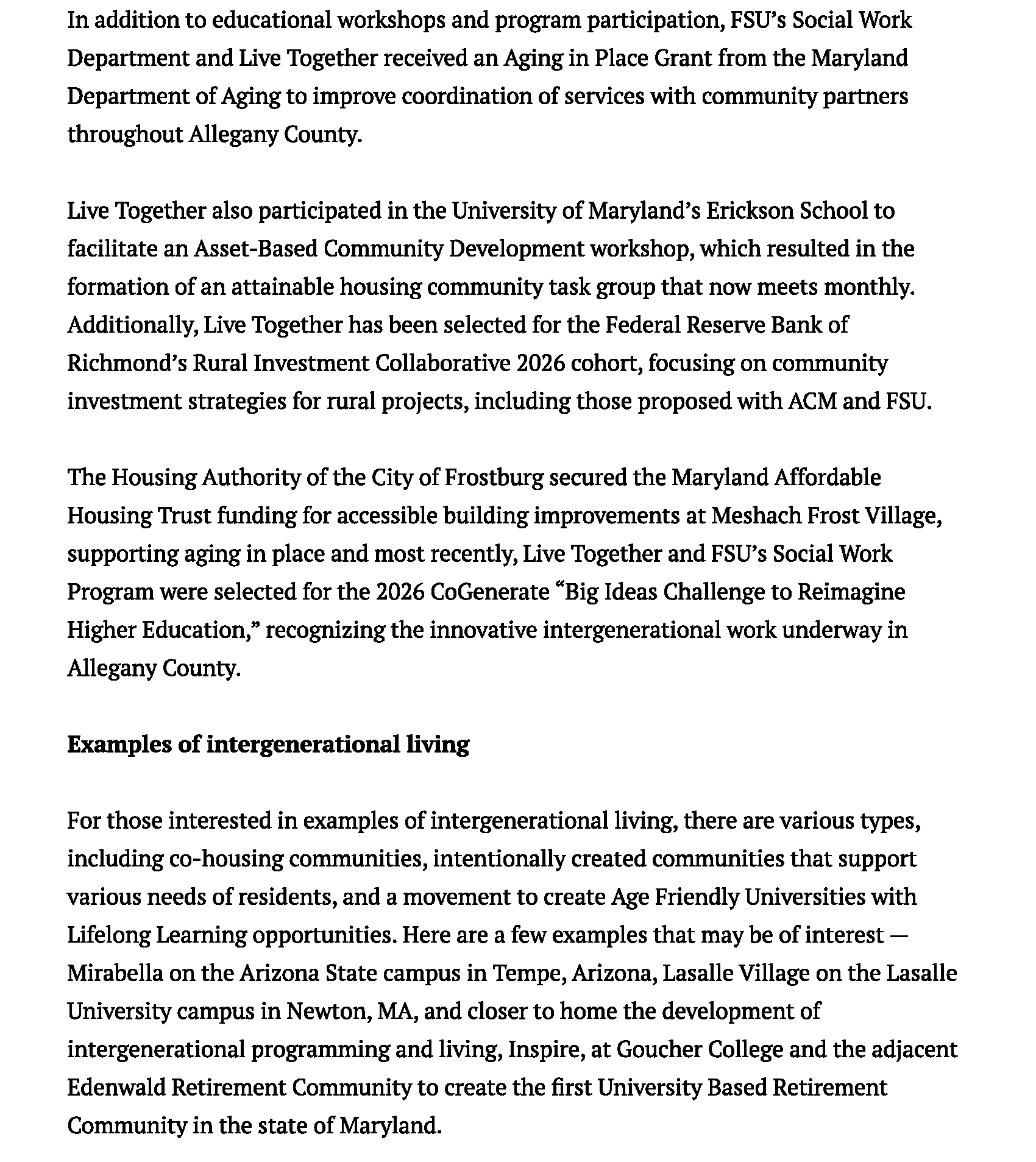Written by: Jane Rohde for the Cumberland Times-News
Live Togehter Community Newsletter: February 2025
Informative Links
Live Together Advisory Council
Demonstration Projects: Allegany County - Willowbrook OutdoorWellness (WOW) Complex
Workforce Development: CleanHealth Environmental (CHE)
Institute Advisor: Barbara Dellinger
Barbara Dellinger
MA, CHID, FIIDA, EDAC, MdCID
Principal, Dellinger Consulting, LLC
As a healthcare interior designer for 40 years, Barbara has provided planning and interior design for projects ranging from small clinics to very large, 1M+ sq. ft., $1+B military hospitals. Focusing on the patient experience, she uses Evidence-based design to view design through the patient’s eyes. Recently retired, as Director of Design and Research for Adventist Healthcare, MD she provided interior design for acute care, rehab, behavioral health, outpatient clinics with emphasis on various populations, such as seniors, as well as to schools for children with social and emotional issues. Working for two major healthcare systems, an international architectural firm, interior designer firm, as well as for a furniture dealership during her career, she gained valuable insight into viewing projects through various lenses where design goals can vary greatly. As a founding member of AAHID, she is currently Director of the Research and Education Committee, is Co-chair of the Center for Healthcare Design’s EDAC (Evidence-based Design and Accreditation Certification) and an IIDA Fellow. She is a new member of the Live Together Advisory Board.
Institute Advisor: Joan Plisko
Joan Plisko, PhD
President and Founder, Plisko Sustainable Solutions, LLC
President and Founder, of Plisko Sustainable Solutions, LLC - a woman-owned small business consultancy that creates environmental and social strategies to help organizations thrive. Joan Plisko, PhD, is an award-winning environmental health and sustainability director, strategic planner, researcher, and educator.
Joan’s life work is based on the premise that people and the environment in which they live, work, play, and pray can become healthier and more resilient with knowledge, assistance, connection, and recognition.
A life learner, Joan is certified as a Fitwel Ambassador, attended Maryland’s Climate Leadership Academy, completed the Permaculture Design Course, attended the Living Systems Leadership retreat, and is an alum of Leadership Baltimore County.
An avid gardener, community leader, mentor, yoga enthusiast, and multi-tasking mom of two, Joan also enjoys traveling and camping in her pop-up. She has a Ph.D. in Environmental Systems Engineering from Clemson University, an M.E. in Systems Engineering from the University of Virginia, and a B.S. in Commerce and Engineering from Drexel University.
Institute Advisor: Christina D. Long
Christina D. Long
AIA Architect, Vertical Architecture Enterprises
Christina is an architect with over 20 years of experience working on large scale academic, research, and transportation projects. In 2018 she founded Vertical Architecture Enterprises LLC to build and serve intergenerational communities through an architecture that advances learning, knowledge creation, and collaboration in spaces reimagined for everyday life. She believes communities are strong, successful, and resilient when they enable members to be lifelong learners. Christina is licensed in the State of Maryland and holds a Master of Architecture degree from the Graduate School of Design at Harvard University. She is a member of the American Institute of Architects and the Urban Land Institute.
Institute Advisor: Annie Levy
Annie Levy
Strategist, Program Designer & Story Officer
Helping people create futures
they want to live in.
Annie works for companies, foundations, and communities to discover futures that people want to live in and designs strategies and programs to both bring those futures to life and ways to make them visible.
She is trained as both a writer and photographer with her BFA from NYU Tisch School of the Arts and holds her LMSW from the Silberman School of Social Work. Combining these fields, she has become a sought-after strategist, program designer, and story officer for leading organizations in both the non-profit and for-profit sectors.
Specializing in the realms of medicine, longevity, place, community, and the well-being of the workforce in those sectors, she works with leaders to discover what matters most to clinicians, staff, residents, and patients.
Her public-facing expressions of the work (e.g, digital galleries, exhibits, websites, books, and live events) serve as on-ramps for reflection, conversation, and actionable change.
Annie’s work has been commissioned by The Frick Collection, exhibited at the United Nations, and is on permanent display at Mt. Sinai West. Her projects have also been an integral part of the National Academy of Medicine’s work about Health Equity and Clinician Well-Being and the John A. Hartford Foundation and Arnold P. Gold Foundation’s communication work. Her unique approach and proven successes have been presented at national conferences including Google Health Ignite, the Cleveland Clinic Empathy & Innovation Conference, and the Center for Health Care Design’s Environments for Aging Conference.
Institute Advisor: Joanna LaFleur
Joanna LaFleur
CEO/Founder, Memory Lane Assisted Living
As a fiercely passionate advocate for those with dementia and their caregivers, Joanna is a truly powerful speaker and impactful trainer sharing a transformative message. After receiving a degree in Recreational Therapy from Eastern Michigan University and spending more than 13 years working with a variety of nursing homes, assisted living facilities, and home care companies, it became clear to Joanna that there is a huge societal gap in dementia care. Knowing something had to be done, Joanna opened a dementia focused home care company in 2013 and in 2016 founded Memory Lane. Memory Lane provides an innovative, client-focused, human-centric assisted living environment in three specialized 6-bedroom homes where individuals with any type of dementia (even the most challenging) in any stage, can live life to the fullest. Joanna’s strong desire to create positive change in this area can also be felt through articles, videos, and frequent corporate training and speaking engagements.
Institute Advisor: Nancy Giunta
Nancy Giunta, PhD
Associate Professor, Director, Silberman Aging, Silberman School of Social Work at Hunter College, CUNY
Nancy Giunta is an Associate Professor at the Silberman School of Social Work at Hunter College, and serves as the Director of Silberman Aging, a Hartford Center of Excellence in Diverse Aging. Dr. Giunta’s experience in the field of aging spans nearly thirty years, most recently with facilitating inter-organizational partnerships and implementing innovative interventions to improve older adult service systems. Her areas of expertise include gerontological social work –home and community-based services, aging-friendly communities, and caregiver support. Her practice revolves around LGBT aging, inter-agency collaboration, and community-based participatory research. Her research examines interventions to address service access inequities among older adults and the people who care for them. Dr. Giunta collaborates with communities locally and nationally on evaluation and technical assistance projects.
Currently, she serves as an evaluator of the National Resource Center on LGBT Aging, an initiative led by Services and Advocacy for GLBT Elders (SAGE). She has authored or co-authored over 50 publications and served as co-editor of a special issue of the Journal of Gerontological Social Work on LGBT Aging. She is a Fellow of the Gerontological Society of America, a Faculty Fellow of the Roosevelt House Public Policy Institute, and was recognized by the New York Academy of Medicine as an emerging leader in the field of Social Work. Dr. Giunta earned her Ph.D. in Social Welfare and a Master of Social Work degrees from the University of California at Berkeley, and a Master of Arts in Gerontology from San Francisco State University. She splits her time between New York City and Northern Appalachia. In her spare time, she is learning and organizing around food justice and local food systems while serving as President of the Board of Wholesome Harvest Food Co-op in Frostburg, MD.
Institute Advisor: Moira Denson
Moira Denson
ASID, IDEC, IIDA, LEED AP
Associate Professor of Interior Design at Marymount University, NCIDQ- Certified Interior Designer
Moira Denson is an Associate Professor of Interior Design at Marymount University and an NCIDQ- certified Interior Designer. She has professional experience in project delivery and interdisciplinary coordination of healthcare, workplace, hospitality and residential building types. She teaches undergraduate and graduate students in health + well-being studios, residential studios focused on Universal Design, as well as sketching and rendering for ideation. Her research interests and writing target improving the design process and exploring the impacts of design on overall health and well-being. Along with enjoying a practice in watercolor painting and digital drawing, she is currently writing and illustrating a collection of short stories on design and aging.
Institute Advisor: Tanisha Cottom-Palmer
Tanisha Cottom-Palmer
COTA/L CAPS
Certified Occupational
Therapist Assistant
Tanisha Cottom-Palmer is a Certified Occupational Therapist Assistant practicing in Baltimore, MD, where she implements treatment plans and monitors the progress of adult patients with physical and mental impairments that effect their performance in daily functional activities. Before attending school, Tanisha worked as recreation assistant in a long-term setting for several years, further shaping her client-based skill set. She has since received a BS in Architecture from Morgan State University, in which she aspires to incorporate into her specialty of home modifications amongst different various demographics, specifically the geriatric population. She currently holds a certification in ”Aging In Place” and aspires to create healthier and safer living solutions across the age spectrum.
Institute Advisor: JJ Cao
JJ Cao
AIA, AP BD+C, EDAC
Architect at Hord Coplan Macht
JJ has been promoting equity throughout her life. She is an active participant of United Way and has helped raise more than $120k to strengthen families and communities across Central Maryland through her workplace’s annual fundraiser campaign.
Her mission is to keep designs connected to the needs of the communities they serve. She believes age is one element in which inequities exist. Deliberately centering age groups with the most marginalized needs is necessary to create thriving communities where all can reach their potential. The passion for creating best outcomes for every individual led her to join Live Together’s Advisory Council.
Having worked with both the manufacturer and user side of the building industry, JJ brings with her experience to come up with person-centered solutions and incubate new ideas. She currently works in Baltimore and helps execute upon social missions for health sciences and healthcare related projects.
Live Together® - Alignment with AARP Age Friendly Communities
Live Together® - Alignment with AARP Age Friendly Communities
An AARP Age Friendly Community is a community in which people can grow up and grow old with ease, is barrier-free, designed for diversity, is inclusive and cohesive, and is a community which optimizes opportunities for overall well-being to enhance quality of life as people age. It designs and adapts their natural and built environment for residents of all ages and different capacities. It meets the needs of people of all ages, whether someone is pushing a stroller or using a walker and allows people of all ages to participate in activities that keep the community healthy and encourage economic stability.
The Live Together® model for intergenerational community is in alignment with that of AARP and the creation of Age Friendly Community.
Live Together® Intergenerational Community
Live Together has a singular mission that is a uniquely transformative idea: that intergenerational living, person-centered care, and integral workforce development can be combined to provide the best environment for underserved residents of all ages to thrive. Live Together® was created as a non-profit that believes in intergenerational living and workforce development co-existing through the development of co-location opportunities to create a continuum of care. Live Together® is an Intergenerational Community model that supports the intersection of supporting youth to succeed and older adults who desire to continue to have purposeful and meaningful lives throughout their retirement.
Increasingly concerned about the impact of institutional care on elders, including the missed opportunities to provide humane solutions during the COVID-19 pandemic, we believe the most effective care strategically groups older adult residents with members of younger generations and deploys well-trained, well-paid care staff in supportive neighborhood solutions that are residentially scaled for all residents. There is no one-size-fits-all solution to the Live Together philosophy. The components of a Live Together community would be applied as appropriate to fulfill the grassroots needs identified by the residents living within a community and geographic area. As the Live Together model expands over time, the components are intended to be additive to meet the changing and evolving needs of residents within a community at-large. This approach can be applied to rural, urban, and suburban settings – addressing various income levels, acknowledging successful service delivery and amenity access currently available, and utilizing community assets that already exist. Identification of gaps in the housing, care, and amenity arenas with alignment of existing resources provides strength for the local economy, promotes intergenerational living, and provides opportunities to maintain purposeful living throughout an individual’s life span. Such networked communities, each tailored to its unique context, will be the next generation of caregiving for improved quality of life and equitable engagement.
Alignment At-a-Glance
AARP Age Friendly Communities and Live Together® Community Model
More Information about Live Together®
Mission
Live Together® is a nonprofit community development provider dedicated to the idea that intergenerational living and person-centered care provide the best environment for older adults to thrive.
We Believe in Intergenerational Living & Person-Centered Care
Intergenerational models can pair mission-minded seniors with underserved youth, ease the burden of adult children by offering close-by access to care, or simply provide venues for the wisdom of the aged to influence the energy of the young. Within each context, Live Together is committed to finding integrative living strategies for all generations to flourish. Person-centered care places the one receiving care at the center of decision making. Rather than acting on the priorities of a corporation, an institution, or even staff, it places resident needs first. The Live Together model impacts how residents live – serving the whole, unique human being versus being reduced to a diagnosis.
Who We Are
Jane M. Rohde, the Founder of Live Together, Inc., the Board of Directors, the Expert Advisory Council and Faculty for the Institute have decades of combined experience in care model development, design, and operations culminating in creating successful, sustainable intergenerational living options. Live Together works with other like-minded folks – developers, community groups, higher education institutions, children’s homes, and local governments to evaluate community assets through the lens of engagement and intergenerational living. It takes an interdisciplinary approach to be successful in creating systemic change!
What We Offer
Live Together® offers the hope of implementable change – working on solutions for residents of all ages to grow and live purposeful lives. Services include Live Together Institute customized educational programming on person-centered care and operations and Live Together demonstration project guidance and services – including partnering with developers, operation and/or management of the various applicable components, and ownership and/or facility management of properties.
The Institute
The Live Together Institute continues to add to existing curriculum and staff training with the intention of furthering meaningful careers in aging based on person-centered care and interdisciplinary philosophies. Workforce development includes understanding and fulfilling the needs of staff – living wage, affordable housing, benefit access, childcare, and transportation – once fulfilled allows staff to focus on their families and careers.
Demonstration Projects
Live Together includes the completion of demonstration projects based on a grassroots evaluation of existing resources and identification of needs within a community, neighborhood, or hometown. By understanding the gaps, needs can be met through partnerships, volunteerism, and community involvement that focuses on positive social impact and quality of life for all residents and all ages.
Live Together components can be cumulative over time and services accessed by all ages within an intergenerational, intentional, and inclusive model – all integrated within the community fabric. A continuum of care is created through various components that serve a specific resident need and fulfill individualized care. Intergenerational communities coupled with workforce development opportunities bridge gaps in our broken systems. It is time to recognize and step forward to support elders, youth, and families in creating a community to live together.





















